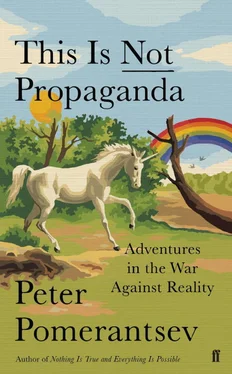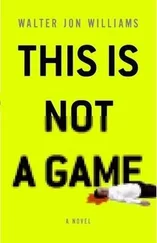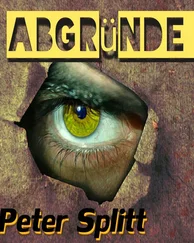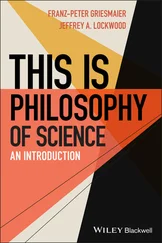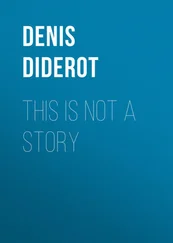During Putin’s almost two decades in power since Pavlovsky helped him become president, the idea of ‘the majority’ has been reorganised over and over, shuffled around, but always managing to unite utterly disparate groups around a rotating enemy: oligarchs at first, then metropolitan liberals, and more recently the whole outside world. Like some actionist performance artist, Putin poses bare-chested in photo ops of derring-do; instead of ideological coherence he offers the emotional highs of the local equivalent to ‘Make Russia Great Again’, bringing ‘Russia off its knees’.
In that time Pavlovsky has been busy. He helped found Nashi, the patriotic youth movement that launched the ‘denial of service’ attacks at Estonia and harasses dissidents and journalists, and whose name, which literally means ‘Ours’, reduces politics to a series of pronouns: ‘them’, ‘us’, ‘ours’, ‘theirs’. According to Dr Ilya Yablokov of Leeds University, an analyst of conspiracy theories in Russia, Pavlovsky’s frequent media appearances in the first decade of the twenty-first century invoked an image of Russia besieged by enemies, with the West planning to turn Ukraine into a ‘huge testing area for anti-Russian technologies’. The ‘Putin majority’ that he helped create became a ‘truncheon to delegitimise its opponents. The division of society into Putin’s majority and its enemies became a dominant political tactic.’ [8]
At one point Pavlovsky got on the wrong side of the divides he helped instil, arguing that Putin should not return to the presidency in 2012 after a stint as prime minister. He was thrown out of the Kremlin. Having worked across such different shades of the Russian political spectrum, he remains an object of fascination and the subject of much comment, a sort of Everyman popping up in Russia’s many tales.
*
When Pavlovsky looks at the West today, he sees it going through the same changes that Russia underwent in the 1990s, a delayed reaction to a similar crisis.
‘The Cold War split global civilisation into two alternative forms, both of which promised people a better future,’ he told me when I interviewed him from the BBC’s studios. ‘The Soviet Union undoubtedly lost. But then there appeared a strange Western utopia with no alternative. This utopia was ruled over by economic technocrats who could do no wrong. Then that collapsed.’
In this flux of identity and ideology political campaigners in the West have ended up adopting strategies strikingly similar to Pavlovsky’s, though enhanced by social media and big data.
‘I think that Russia was the first to go this way, and the West is now catching up in this regard. In general, the West can be considered to follow a proto-Putinism of sorts,’ remarked Pavlovsky, wryly.
This is the great paradox of the end of the Cold War: the future, or rather the future-less present, arrived first in Russia. We are just catching up. Though maybe there’s a simple cultural logic at work here: if our own ideological coherence was based partly on opposition to the Soviet Union’s, when it collapsed we would inevitably follow.
In his book of conversations with Krastev, Pavlovsky invokes his mentor, a Russian historian of the Holocaust called Mikhail Gefter, who in the late Soviet era had already argued that mankind was running out of unifying, universal visions of historical development. In the 1990s Gefter predicted that the end of the Cold War would usher in an era of ‘sovereign murderers’. In the absence of norms we have vacuums in which chaos agents behave according to rules they make up for themselves as they go along, who murder people and indeed whole peoples according to their own ‘sovereign’ logic. Pavlovsky sees this as prophetic, a vision from the early 1990s that anticipates 2019. ‘The image of a common mankind is impossible, and no alternative has emerged. Everyone invents their own “normal” humanity, their own “right” history.’
The current Russian regime finds itself at ease in this environment because it has been finding ways to adapt to it for longer. There’s nothing mystical at work in its all-pervasiveness; it simply has a slight head start. And as our world becomes more uncertain and liquid, in ways which echo the new Russia, the more one can be tempted to yearn for the seeming certainties of the Cold War: if the Kremlin is the great enemy again, then maybe we will rediscover our own, once victorious meanings, a desire which in turn augments the current Kremlin’s status, which risks playing into what it wants.
If there was one overarching aim to all of Pavlovsky’s ‘political technology’, it was to resurrect the idea of the strong state when it had all but come apart. Back in the 1990s he’d figured out that though the Kremlin might be weak, he could make it seem strong domestically by spreading it everywhere in the information flows and media landscapes of people’s lives. Now Putin, Pavlovsky told Krastev, can simulate global influence by purposefully leaving the fingerprints of his hackers and information operations all over the world. ‘It’s all just theatre for a world audience. Theatrum mundi! ’
Part 6: The Future Starts Here
Conclusions and Recommendations
Before he came to meet me at South Kensington Tube station, Nigel Oakes had visited an exhibition at the Victoria and Albert Museum entitled ‘The Future Starts Here’. While strolling through the exhibit he suddenly found himself riveted by a display. His heart rate shot up, he started trembling, he had to rush outside for air.
The display, which was called ‘Can Democracy Survive the Internet?’, was dedicated to a ‘global election management’ company called Cambridge Analytica. Cambridge Analytica claimed to have gathered 5,000 ‘data points’ on every American voter online: what you liked and what you shared on social media; how and where you shopped; who your friends were… They claimed to be able to take this imprint of your online self, use it to understand your deepest drives and desires, and then draw on that analysis to change your voting behaviour. The boast seemed to be backed up by success: Cambridge Analytica had worked on the victorious American presidential campaign of Donald Trump; it had also run successful campaigns for US Senator Ted Cruz (twice); and others all across Africa, Asia, the Caribbean, Latin America.
The reason Oakes was so overwrought was that here, finally, was proof that he had been right all along. Cambridge Analytica was a spin-off from a company he created, Strategic Communication Laboratories (SCL), and it drew on his philosophy. All his adult life he had tried to prove that he had discovered the secret of mass persuasion. At first he had been laughed at, then criticised, but now his ideas were being paraded as an exhibit of the future in a world-renowned museum.
When we meet a little later the same day, Oakes is wearing a grey suit and a cap with the SCL logo on it, pulled low over cornflower-blue eyes.
‘The thing about most advertising and influence campaigns – they’re absolute bollocks,’ he tells me at the start of our conversation. His dream, he repeats several times, was to create the ultimate influence weapon. Like any weapon, argues Oakes, it could be used for good or ill. He readily calls himself amoral.
He hadn’t started off thinking about ‘strategic communication’. He had originally wanted to be a composer, but there were no courses for composers at the Royal College of Music and he wasn’t good enough at playing any one instrument to get in. After leaving school, he wrote theatre scores, but there was no money in that. He still composes organ pieces for weddings in the style of late baroque. Oakes smiles beatifically and hums when he recounts the joy of holding a whole crowd transfixed by music. But as a young man he needed a real career, and in 1988 he joined the advertising company Saatchi and Saatchi.
Читать дальше
